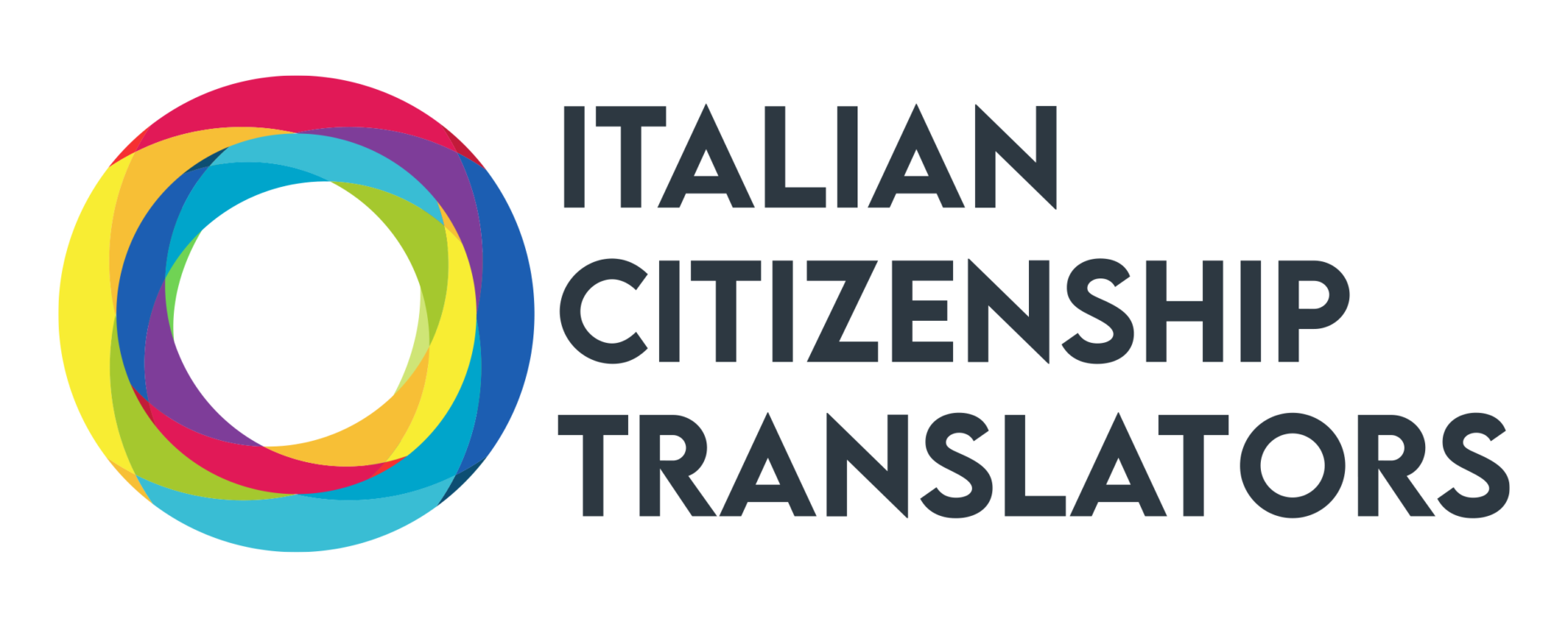
Italian Citizenship by Marriage: Document and Translation Requirements
Obtaining Italian citizenship by marriage is also known as Jure Matrimonii. This article will explore that process and, more specifically, will discuss what documents are needed, and what the requirements are in terms of the translation of documentation from English to Italian.
Making an application
If residing abroad, the application for Italian citizenship by marriage must be filed at the local Italian consulate (where the Italian spouse is registered with the AIRE). This can be done after three years of marriage. If the couple live in Italy, after 2 years of marriage, the citizenship application can be filed at the local prefettura.
The above time periods are reduced by half if the married couple has children.
The application for Italian citizenship by marriage is made up of two stages: the online application and then the appointment, at either the prefettura or consulate, to present original documents and provide a signature.
The first stage is done on the web portal of the Italian Ministry of Interior and it is necessary to complete the online application and upload scans of all documents.
The applicant must register through the portal “ALI” by creating his/her own account at this link: https://portaleservizi.dlci.interno.it/.
It is not necessary to book an appointment at the consulate or prefettura because all the documentation needed for the process will be submitted online through the web portal for a preliminary assessment.
Your application will be reviewed by your local consulate/prefettura and you will then be invited to attend an appointment in order to submit all documentation in the original.
Documents needed
To apply for Italian citizenship through marriage, the following documentation is required:
- A copy of the marriage certificate from the Italian municipality where the Italian spouse is registered with AIRE;
- Criminal background checks from the US States (and foreign countries, if applicable) where the applicant has lived since the age of 14 and from the FBI (State and Federal levels need to be covered);
- A certified copy of the foreign birth certificate;
- B1 (intermediate level) Italian language certification. The certificate needs to be issued by an institution which is officially recognized by the Ministry of Education (MIUR) or Ministry of Foreign affairs (MAECI).
Documents (original copies) needed for interview stage with the consulate or prefettura:
- Italian passport (original and photocopy);
- Non-Italian spouse’s foreign passport and State ID (original and photocopy);
- Proof of residency within the consular jurisdiction, if the couple resides abroad (original and photocopy);
- “Signed declaration” by which the spouses declare to be still married;
- Long form certified copy of the non-Italian spouse’s birth certificate with Apostille and translation into Italian;
- Marriage transcript from the Italian municipality (estratto per riassunto dell’atto di matrimonio);
- Criminal background checks from the US states and countries where the applicant has resided since the age of 14, with Apostille and translation into Italian;
- Application form;
- Residency list;
- Italian language certification (B1 level);
- Receipt of the €250 wire transfer;
- A money order to pay the consular fee due for the legalization of the translations.
Note: An estratto per riassunto is a certification that lists the basic information about the record. It is different from a copia integrale, which is a copy of the original entry, citing any information that is listed on the original record.
After the appointment at the consulate, the documents will be sent by the consulate to the Ministry of Interior for processing.
Translation requirements
All documents in languages other than Italian must be translated into Italian, and the translations must be certified by the local Italian consulate. After the legalization and translation into Italian of all the documents, you can continue to the online submission and the final appointment.
If you apply for citizenship through an Italian consulate in the U.S., then your vital records must be translated from English (or the language they are in) into Italian.
If applying in Italy, it is possible to opt for apostilled or sworn translations. Apostilled translations are certified translations which bear an Apostille seal and are officially recognized by any Italian authority abroad. An “Apostille” is an international legalization which enables a document for foreign use.
The translations are attached to an oath that the translator signs before a Notary stating that he/she is legally responsible for the accuracy of the translation. The certification will be both in English and Italian, and it will be signed by the translator and bear the notary’s stamp, which means the document can then be legalized with an Apostille.
In Italy, if a translation is sworn (in Italian traduzione giurata, also known as traduzione asseverata) it means that it has legal value. A sworn translation is an official translation of the certified, original document, and must be authenticated by a public officer at an Italian court, or by a notary public. It must be done by a sworn translator. A sworn translator (traduttore giurato), accredited by the local court or Chamber of Commerce, is permitted to translate documents.
In summary, translations can be certified by an Italian consulate aboard, by a professional translator before an Italian court official, by a professional translator before a public official abroad (a U.S. public notary, for instance), or a by professional translator before a Notary in Italy.
Once all documents have been legalized and translated to Italian, you must then submit the application online and make appointment at the consulate, or prefettura, to review your application, and to present original documents.
The importance of translating documents
Italian consulates make it mandatory that the language and meaning of records appear exactly as it does in its original format. It is for this reason why it is so important to use professional translators: to ensure quality and accuracy. Any errors or discrepancies in the document will delay your application or result in rejection.
Some consulates outside the U.S. may even ask that translations be certified by a professional translator before you submit your application. This is also true regarding vital records issued by the country where the consulate is situated.
Vital records that have been issued by any EU member state outside of Italy do not need to be translated, provided that they are issued in a multilingual format.
As stated, it is mandatory that documents are translated into the Italian language and the translation must be certified by the Italian Consulate or Embassy in the country of issuance. Please be aware there are different types of legalizations, and so in order to know which type of legalization is required, you must refer to the advice given by the relevant consulate.
The translation of documents into Italian forms a vital part of your application. Furthermore, Italian consulates are strict in terms of any discrepancies and inconsistencies in documentation, which would result in delay and possible rejection. Discrepancies and inconsistencies typically show up in the form of name changes, name misspellings, Americanized versions of names, nicknames, dates, and birthplaces.
It is important that you check the accuracy of names, dates and details of these documents because any corrections would require an “affidavit to amend a record” from the Vital Statistics Office which will cause delays.
Cost
In Italy, the marca da bollo is a stamp duty that is often required for various legal and administrative documents. It will be needed in the case of an application for citizenship by marriage. You can purchase the marca da bollo at authorized locations in Italy, such as post offices, tobacco shops, and some banks, the cost is €16.
When applying at an Italian consulate for your citizenship, the processing fee is €250, which typically does not include the certification of document translations.
If you choose to use a translator in Italy, the processing fee for translations is €16 every 4 pages, when the translations are certified by a public official. This fee is paid using a marca da bollo as mentioned above.
Waiting time and next steps
The processing time for citizenship by marriage applications is between 2 and 3 years, depending on the volume of applications.
Once citizenship is approved, your non-Italian spouse will need to attend a citizenship ceremony and take the oath of allegiance, and the Italian spouse will need to attend also, in order to sign an affidavit that no separation, divorce, or annulment took place during the processing period. This ceremony will happen within six months of citizenship being granted.
This article has explained what documents are needed, the requirements regarding the translation of those documents, and the importance of ensuring accuracy in translations when applying for citizenship through marriage.
If you would like to know more about our services and how we can assist you, please visit our homepage, or contact us directly and one of our translation specialists will be in touch.
